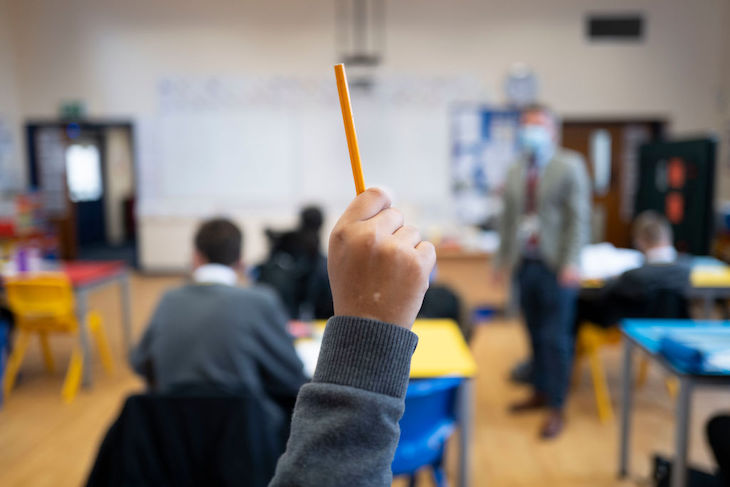Over the past five years, Britain has seen a dramatic rise in the number of people claiming disability benefits. There are now 2.8 million working-age adults who are economically inactive due to long-term sickness, a figure that has risen by over 700,000 since 2019. Personal Independence Payments (PIP) are also increasing rapidly, with over 50,000 new applications every month.
Personal Independence Payments (PIP) are increasing rapidly, with over 50,000 new applications every month
It is certainly true that the pandemic contributed to these figures, but the UK is the only G7 country that has not seen economic inactivity fall back toward pre-Covid levels. The UK is now a stark outlier. What appears to be driving this extraordinary surge is the number of mental health-related claims, particularly among younger adults.
As pupils return this week for the new academic year, what is apparent from these statistics is that the escalator for this welfare dependency starts in our schools. The number of 16-19 year-olds receiving PIP has more than doubled since 2019, and 70 per cent of all PIP claims among under-25s are due to mental health or behavioural conditions. In England, one in five pupils receive Special Educational Needs (SEN) support, often tied to emotional or psychological diagnoses. Many are leaving school not only with disrupted attendance and limited qualifications, but already formally labelled as having some form of incapacity. A teenager struggling with anxiety, for example, may see that as a permanent condition rather than something temporary related to puberty. For increasing numbers of young people that initial diagnosis, whether for depression or ADHD, is then carried over to adult life where such conditions can allow those same people to claim disability benefits.
Too many public institutions, particularly schools, have become complicit in a culture that pathologises ordinary emotion and channels young people toward the welfare system rather than the workplace.
This path comes at enormous cost. Rising welfare spending is a challenge on its own. The more serious concern is the message we are sending. If discomfort is treated as a disorder, and the response is financial entitlement, then we are teaching a generation to seek support before they find solutions.
Schools sit at the critical junction between childhood and adulthood. They shape how young people understand the world and how they understand themselves. When emotional difficulty is framed as something permanent or pathological, it seems far more likely to become embedded. The consequences are far-reaching. Temporary feelings are recast as conditions that require treatment. This not only leads to increased demands on the health service, but also often comes with extra state financial support too, which then makes it harder to earn more in any first job than on benefits. But the deeper cost lies in what this teaches the next generation: that ordinary struggles signal incapacity, rather than something that can be overcome. We should, in short, be building resilience.
The government appears uncertain about how to define mental health. Within days of urging schools to clarify that feeling low or anxious is not the same as having a clinical condition, the Department for Work and Pensions was publishing guidance on how to stop people feeling anxious while completing a PIP application. Officials suggested softening the language in application forms, offering emotional reassurance, and avoiding situations that might feel overwhelming. One department is encouraging resilience in the classroom. Another is building a benefits system on the assumption that even administrative tasks can be psychologically destabilising. This contradiction only deepens public confusion over where genuine clinical need ends and plain discomfort begins.
There are those who seek to blame the pandemic or social media for this rise in the number of claims among under-25s, but the evidence is thin. The truth is more uncomfortable. The state has created systems that reward fragility. It is far easier to secure support as someone defined by what they cannot do than to be recognised for what they might achieve.
That is the real tragedy. Most young people want purpose. They want to earn, to achieve, to build a life. For many dealing with mental health difficulties, meaningful work can be a vital part of tackling their condition. Employment brings structure, social interaction, and a sense of contribution. The alternative, placing individuals on long-term welfare, siloed from society and left to drift, can deepen isolation and worsen outcomes. Reintegration, with the right support, is far more likely to work than indefinite payouts, funded by those in work. Therapy, encouragement and practical help to access the workplace should be the first response, not the last.
The challenge now is political as much as it is educational. Ministers talk about promoting resilience and reforming benefits, but unless the messages are consistent across government, they risk undermining their own objectives. It makes little sense for the DWP to tighten assessments while schools are still dishing out emotional labels.
Support should be available for those who truly need it. But we should not be in the business of teaching young people to see themselves as patients. The current model sends the wrong signals. It encourages young people to define themselves by limitation. Over time, the consequences of that approach will become harder to reverse.
There is still a chance to change course. The system we choose to build now will shape the expectations of the next generation. If we continue to reward fragility, we will simply create more of it. If we aim to restore independence and aspiration, we must begin by ensuring that we create a system and processes that will deliver that.







Comments